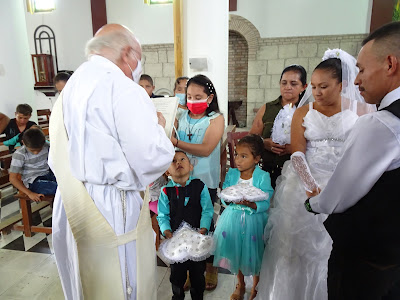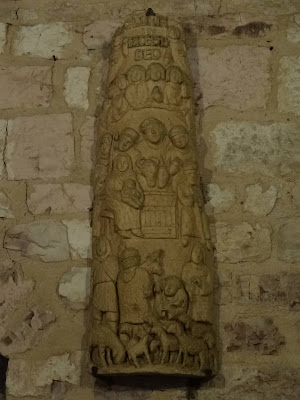As I entered the house of the couple I was staying with, this is what greeted me - the awe-inspiring beauty of fall in Iowa.
The highlight of my trip was being able to visit the dying father of a friend I’ve known for more than thirty years.
I arrived in Ames on Thursday night and went out to visit my friends and his father Friday morning.
His father was largely non-responsive, but when I entered I knelt by the side of his hospital bed in the living room of his home and talked and prayed with him. I thought I saw a smile (which my friend and his wife verified), but, most of all, I felt blessed to be able to be, once again, at the side of one who is on the road – to his new destination.
Monday at 12:15 am, Bud passed on to the Lord. I now pray, what I prayed with him"
May the angels lead you into paradise; may the martyrs – and the two Marys, Mary the mother of God and Mary his spouse – receive you and lead you to the holy city Jerusalem.
I also got to see a number of other friends – and enjoy time with their children.
Late Monday afternoon I spent a few hours with a couple I’ve known since their undergraduate days and their six kids, five girls and one boy. He was the student who pushed me to organize a trip to help out in New Orleans after Hurricane Katrina. My experience there opened me and led to my leaving Ames for Honduras.
There were other persons I visited and I also met with the church committee which is supporting our parish here in Honduras, as well as members of the group importing coffee from here.
I also served as deacon at all the weekend Masses, as well as the Thursday night Mass on the day I arrived.
The visit was filled with opportunities to meet with people I don't see often and eat some good food - including a delicious strawberry rhubarb pie. (The one food I most miss in Honduras is rhubarb!)
But a movie and a book helped me make sense of the visit - and of my life.
The visit was sandwiched between watching a movie on the plane from Honduras and finishing a book last night. Both help me understand who I am and my mission.
I usually read on planes, but I noticed that I could watch the film “In the Heights” on the flight from Honduras to Houston. What a joy. I laughed and cried during most of the film. It is set in Washington Heights in New York City and features mostly people from the Dominican Republic. I recommend the film. I have heard a few criticisms but I think they don’t realize that it’s a work of magical realism. I won’t give away a most important part of the movie but seeing a couple dance on the side of a building was pure joy – and pure magical realism.
While in Ames, a new book by Fr. Greg Boyle, SJ, the founder of Home Boys in Los Angeles, was delivered to my Kindle, The Whole Language: The power of Extravagant Tenderness. (I had pre-ordered it.)
I started to read it – and, again, I laughed and cried through most of it. It’s not for everyone; if you can’t take strong and occasionally vulgar language or are tied into a sin-based religiosity, this will be a challenge. But if you want to see reality and its possibilities, if you want to see grace, read it.
As Father Greg – G – writes on page xv:
Allow the extravagant tenderness of God to wash over us. Permit the lavishing of such love to surround and fill us, then go into the world and speak the “whole language.” This is the fluency of the mystic, who chooses to live in the soul, inhabiting the tender fragrance of love. The longing of the mystic is to be at home with yourself and then put the welcome mat out so that others find a home in you.This is, in my mind, what a follower of Christ (and every decent human) is called to do: put out the welcome mat, open the space where people who are despised and rejected can recognize their inherent dignity, live with extravagant tenderness. For as Father Greg writes:
We are all meant to be in the world who God is: loving, compassionate, and kind.






































